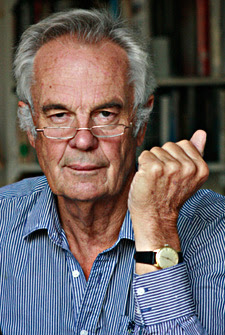George Orwell, the author of “Animal Farm” and “1984”, was the first person to use the phrase “Cold War” in a 1945 newspaper article, written just after the nuclear bombing of Hiroshima and Nagasaki.
He argued that “the surface of the earth is being parceled off into three great empires, each self-contained and cut off from contact with the outer world, and each ruled, under one disguise or another, by a self-elected oligarchy. He counted the US and Western Europe as one, the Soviet Union as the second and China as the third.
He concluded that, “the atomic bomb is likeliest to put an end to large-scale wars at the cost of prolonging indefinitely a peace that is no peace”.
By Jonathan Power
I think he got it nearly right- or so it seems as a new Cold War erupts between the West and Russia and China spars with the US over the South China Sea and its islands.
Of course it’s more complicated than that. China and Russia have a fair relationship. China and the US are perhaps doing nothing much more than annoying each other and the bonds of commerce and student exchanges bind both the elites and the populaces close together.
To me a new Cold War is nonsense on stilts. Even more than the original one.
George Kennan, the US former ambassador to Moscow and the author of how to contain the Soviet Union, always insisted that Stalin had no intention of rolling his tanks into Western Europe.
As Robert Legvold summarizes Kennan’s views in his interesting new book, “Cold War”, “The threat the Soviet Union posed was political, a threat accentuated by these countries’ vulnerability to Soviet subversion because of their economic frailty and political instability- a threat requiring a political and economic response, not a military one”.
In 1948 Kennan wrote, as he observed the creation of NATO, “Why did they [Western leaders] wish to divert attention from a thoroughly justified and promising program of economic recovery by emphasizing a danger which did not actually exist but which might be brought into existence by too much discussion of the military balance and by the ostentatious stimulation of military rivalry?”
It was Kennan, backed by people like Robert McNamara, (who was the Secretary of Defence under both presidents Kennedy and Johnson and a committed bomber in the Vietnam war) who told President Bill Clinton that he was expanding NATO after the end of the Cold War in defiance of many promises to President Mikhail Gorbachev made by both US and European leaders and that this was the worst of all possible mistakes.
Now NATO’s membership has expanded up to Russia’s border and NATO troops are deployed closer to Russia than agreed with Gorbachev.
Moreover, the anti-ballistic missile system now being installed to ward off a supposed Iranian attack could be deployed against Russia.
We forget that Russia has supported the US in Afghanistan and let American war materials be carried on its railways.
We forget that Putin was the first to call President George W. Bush after the 9/11 attack.
We forget that Putin seriously considered asking Nato for membership.
We forget that both Gorbachev and Putin at one time visualized Russia becoming part of the EU.
We forget that Russia returned to being a Christian-inspired nation that also gave religious freedom to Islam and others.
We forget the time under President Boris Yeltsin when he pushed hard to remove the barriers to human rights.
We forget the progress made under Gorbachev, Yeltsin, Medvedev and Putin in reducing the armoury of nuclear arms. With the Americans they have reduced stockpiles from 70,000 to 16,300.
This ended the US-Russian race between offensive and defensive strategic nuclear programs. Russia with the US has eliminated whole categories of weapons. They have worked together securing nuclear weapons and materials in Russia. They have placed limits on large standing armies in Europe while introducing transparency and mutual trust into their operations. (This is crumbling since the Russian interference in Ukraine.)
We forget when Dimitri Medvedev was president he published in 2008 a well thought out multi-dimensional plan to enhance European security.
Legvold says, “The US and Europe brushed it aside”. In Ukraine the US and EU self-defeatingly walked away from a compromise arrangement they had worked out with President Victor Yanukovych that could have avoided further political upheaval.
Today we overlook that Russia is committed to defeating ISIS more than it is committed to supporting the regime in Syria.
Last year Rodric Braithwaite, the former UK ambassador to Russia, wrote in his book:
“For a decade Westerners lectured Moscow where its real interests lay, and expected it to follow where the West led. They rarely listened to what the Russians said in response. Russian concerns seemed unimportant, misguided or unacceptable”.
Is a new Cold War called for? Definitely not.
Just some wise Western leadership.
See: PressInfo # 378: A New Cold War…










